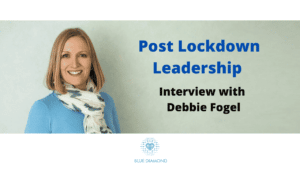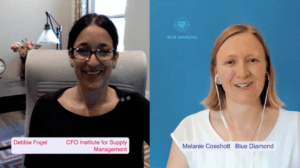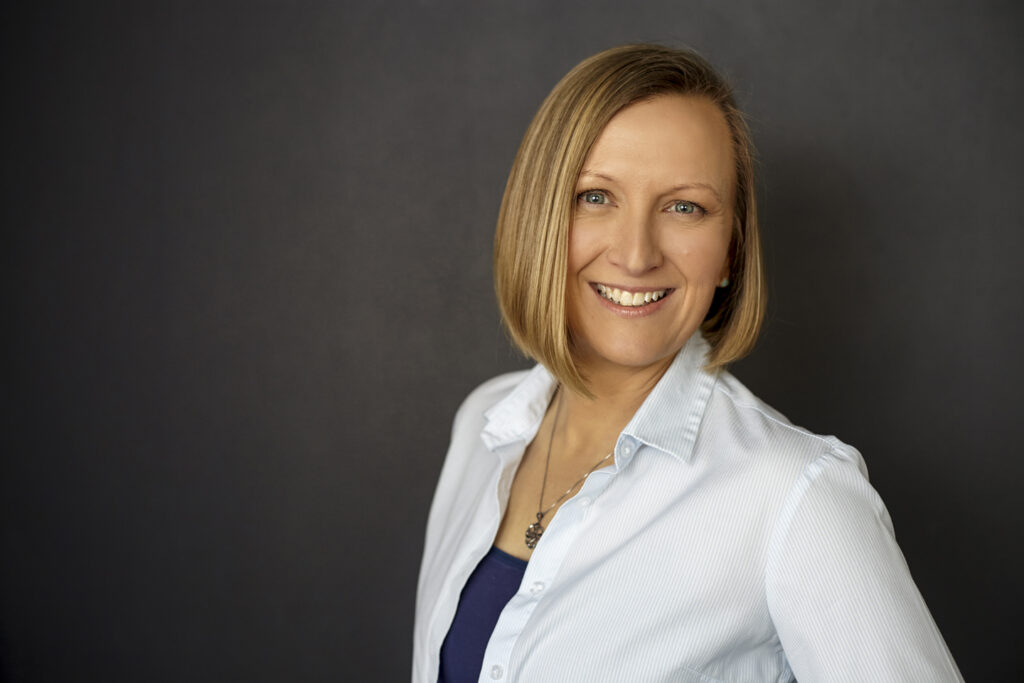
This interview with Debbie Fogel forms part of the Blue Diamond Post Lockdown Leadership Review.
We discuss what great leadership looks like, how to practice self-leadership, and leadership traits for career success.
In addition, we look at anticipated changes in working practices and key skills for success in the post-lockdown economy.
Watch the interview with Debbie Fogel here
Post Lockdown Leadership Review – Interview with Debbie Fogel
Melanie Coeshott (MC) Good afternoon, Debbie. Welcome to Blue Diamond this afternoon!
Now, we met around 15 years ago and worked together between, I guess, ten-to-fifteen years ago.
I know that both before that and since that you’ve been involved in a number of different senior leadership and senior management roles. So, you’ve probably experienced that firsthand, but you’ve probably also worked with some great leaders during that time.
What are you doing today? Tell us about your current role.
Debbie Fogel (DF) – Right, yes well, we met when I was in Europe with Mastercard, and my last role there was CFO for the region.
So, after that, I left and went to New York with MasterCard, where I led the internal audit function for three years and then the financial planning function for three years. And then my last role there was CFO for MasterCard International Business, encompassing everything but North America essentially. And it was great.
Then I took a very difficult decision to leave a great company and moved back to Arizona, where I grew up, to be closer to family. I took a role as CFO for a small not-for-profit organization called the Institute for Supply Management. We are a professional association for people who are in the supply management profession and supply chain, which of course, in this current time period is critical. So, it’s thrilling to work for an organization that is supporting society and professionals that want to learn and develop their skills in that profession.
MC – that sounds great, it sounds really interesting and probably very pertinent at this point in time, with so much change going on in the world.
It’s very exciting. I love the role. Of course, I lead the finance function, but I also have the IT organization and human resources, as well as our customer care centre. So, I’m leading all the support functions in the organization. In a small organization, there are normally broader responsibilities and I’m loving that I’m learning lots of new things and it is very exciting.
MC – that’s great, so you have a lot of interaction with some business leaders and you probably have done throughout your career.
What does great leadership look like to you?
DF – Well, that’s a great question.
I guess there’s a kind of a textbook answer but I think my reflections are really looking at the people that I’ve worked with and for, both the good and the bad! Early on in my career, I remember thinking for some “that’s the kind of leader I want to be” and for others “that’s the kind of leader I really don’t want to be” so I think there’s learning on both ends. But a few things come to mind as to what makes a great leader to me.
The first one is certainly authenticity. I think knowing yourself, your strengths and shortcomings is very helpful, and having people around you that complement your skill set and where you feel comfortable with that. As well as authenticity, in terms of behavior it’s about really doing what you say. I think people in an organization get very confused when we say one thing and do another. And I definitely enjoy being an organization and trying to emulate that myself, that is we do what we say.
Second, I think having an innate care for people is really important. I do really care about the people that work in the organization and work on my team, and so that comes very naturally I think people sense that I care about their development and their success and the team very much. I appreciate that as well in the leaders that I’ve seen and I think that compassion really comes across in terms of great leadership.
I also think communication is really important: clarity of thought as a leader is really important to help the organization understand where we’re going. And even when there are issues, really having that clear thinking and the ability to communicate that out to others is really important. That also comes with listening, but I really think being able to communicate vision and intentions and the big picture, decisions and the context of decisions is really, really important.
Then I also think that having a learning mindset, being open to change, and being open to other people’s input. We hire smart, great people. We should listen to the people around us and not have to have all of the answers ourselves. So, I think a great leader really listens to others and is open-minded.
I think people don’t enjoy (at least I don’t) working around people who have all the answers, because then we don’t feel like we’re making an impact with our experiences and the way we think, and that collaboration doesn’t exist when there is a lack of open-mindedness. I think that’s really important.
Then, of course, it maybe goes without saying but I’ll say it anyway. I think it takes courage to be a great leader. The risk of being vulnerable and making mistakes, and the responsibility of it takes courage, sometimes difficult conversations, as well as some optimism.
I am reflecting on a few great leaders that I’ve worked for and one of their wonderful traits was that ability to take a huge challenge, something that felt potentially devastating to the organization, and really turn that around as an opportunity, through a positive lens. I’ve definitely respected that skill – I think it’s super important.
Then again back to the ‘no hypocrisy’. I personally don’t like to work for organizations that are full of hypocrisy. Really, it’s back again to that first point about authenticity and doing what we say.
MC – Wow. That sounds like a whole patchwork quilt of different traits that feed in and contribute to great leadership. I love that and I was seeing the different colors as you were talking through these different aspects!
So, one of the things you mentioned was self-awareness and I think this is so important as individuals that we have this. And this brings me to the topic of self-leadership.
What do you interpret by self-leadership and how do you practice this?
DF – I feel that self-leadership is really very similar to leadership, just over ourselves, instead of others. I think many of the traits of great self-leadership really apply almost in the same way right: knowing oneself, being authentic to oneself, being open-minded, having a learning mindset, and being very adaptable to change. I think for me; self-leadership is really about being willing to try new things and take risks.
I’ve been very fortunate in my career. I had a lot of opportunities that came to me whether it was to work internationally for the first time at a very young age or in a role that I hadn’t previously done and just taking those risks and trying new things, I think this is one of the ways that I practice my own self-leadership and just thinking differently. I think that what can happen is that people tend to use a solution that worked before for a new problem and I think we have to always be thinking about “what is the problem now?” and be creative about how to solve this problem at this point in time.
Those are the things that come to mind for me right, similar to what we talked about with great leadership.
MC – That’s great.
So, now thinking about your organization,
What signs of leadership do you look for in your own staff?
Whether that’s in terms of helping them to set themselves up for success, or to get them in the right position for promotion or different opportunities.
DF – That’s a great question.
What I look for in my only team are some of the same principles.
Definitely that learning mindset, continual learning, and education to solve problems or to learn new technologies or new ways of working with others, depending on the project or the team, or the organization. So, really learning new things.
I definitely think that being optimistic and looking for ways to make things successful is really important. In my team, it’s not okay to blame others. If something doesn’t go right, it’s our job to make sure things go right and see things ahead of time and what is potentially missing or what needs to be done to be successful and really help others be successful. So, having a can-do attitude and leaning in on what will make me, what will make the team, and what will make the organization successful.
I also think that having good listening skills and respect for others and really listening to others’ inputs is an important trait as people grow with the organization to also become leaders.
And I would add that I also appreciate a broad set of skills and experiences. Even if it’s outside of work, doing more than one thing, trying new roles, or even new experiences within the organization. I think that variety helps us to think and make links to things that wouldn’t otherwise, and it could be hobbies or even different professions, you know changing professions – I think that’s very courageous – or different functions within the organization.
I think that a broad set of experiences really brings that diverse thinking and so I look for that from my team.
And perhaps signs of servant leadership. I think those that are willing to help others and support others – even if it’s not for their direct success or if it’s not visible – but those people that are willing to support others and help them learn and help them be successful become really good leaders, I’m a big believer in that servant leadership thinking and I look for signs of that.
MC – Right, so another patchwork of some similar and some additional traits.
As you know the world has changed as we could never have imagined over the last couple of months and yet we’re probably still going to be experiencing some more change in the coming times.
What changes in terms of working practices do you anticipate in the next 12 months and beyond?
DF – Well, I’m sure there are changes yet to reveal themselves. I believe we’re still in the middle of a lot of change and the chapters of the book are still to be read. But I think there are some things that have become very clear already.
One obvious one is the remote work situation, I think some people feared remote work, even as a leader managing an organization. Or I think people may have tended to behave ‘out of sight out of mind’, because it was a few people in the office and we just, by habit, tended to go to the people that were in the office because in the old days, if you weren’t in the office you were on vacation or you were out of office for whatever reason and so we got used to calling on other people who were in the office. I think now that everyone, or nearly everyone, has had to work remotely, at the same time, some of those myths about remote working will have been squashed and I think we’ll find that it’s more common, more accepted, and more productive for people to work remotely. So, that’s for sure, a clear change.
And then there are many behaviors around that that become different, how we lead, how we communicate, how we interact, finding time for casual conversation, maybe not focused on the task at hand, but just building the team and building trust and getting to know the human behind the work.
I think that remote working to the scale that we’ve done will definitely change the future.
I think too it’s going to accelerate we way we innovate and whether it’s new products or new solutions in our business or infrastructure, this timeframe has really accelerated. How do we deal with the issue that we have? As an example in the institute for supply management, when we look at the impacts on the supply chain, I think people will be thinking not only about low-cost solutions for their supply chain, but also more resilience and maybe back to the days of having physical inventory and not just building to order or everything sourced from one supplier all over the world because there’s a lot of complexity in supply chain and in some cases, not even the visibility to the whole supply chain.
I think that is certainly going to change the way we think about how we run our business and how we get organized.
MC – Absolutely.
So how will you lead and manage yourself and others through this change?
DF – Hopefully well.
You know one of the things that we’re doing is just trying to think.
First, the people in the organization and their wellness, both the ability to manage to work remotely, but also their whole person and not just how productive are they and what is their output, but really thinking about flexibility, allowing people more flexibility in terms of when they work and how they work.
Certainly, we have put in a lot more, purposeful informal communications. We have instituted a daily stand-up for the whole organization where, before we had more of like a quarterly All Hands meeting. I meet with my team by video and definitely spend some time just asking how people are doing and asking “What’s going well?” But also, it’s okay that things are not going well, allowing everyone to be honest about the challenges we’re facing, whether it’s managing child care at home, that we weren’t expecting, or interruptions to videos that we weren’t expecting. And there are lots of funny little videos online about that. But, I think that flexibility and understanding, and compassion have definitely been necessary and I think that’s a good thing. Granted, it should have always been there, but we focused on the office and productivity and work, maybe a little bit more than we should have. During this time frame, finding ways to connect and care about others is definitely something we’re doing.
I also think investments in innovation are important. I know many organizations are really struggling with just surviving during this timeframe, but to the extent that it’s possible, considering the way you work and the products you serve. We support customers who are thinking about investing for the long term, not just surviving short term and that’s a big challenge right now. All right there is that balance between short term and longer term, and that was always there, it just looks a little different right now.
MC – And finally, none of us has a crystal ball, but…
What skills do you perceive will be the most important to help us through this period?
DF – Well, I definitely think the first one is resilience. I think we have a lot of challenges right now and additional stresses, whether it’s concerned with health and well-being for ourselves or our loved ones or the ability to work remotely. All of the changes that we’re facing create stress and I think being able to just survive through it and be resilient is probably one of the most important things. I think doing that is just taking it really truly one day at a time, one step at a time, and we don’t know what’s going to happen in a week, or a month or several months from now potentially, but we maybe don’t need to know. I just deal with what we have to do right here right now and that helps us to be resilient.
I definitely think showing empathy in a stronger way is really important during this particular time, because of all of this stress and helping each other be resilient. We’re showing more empathy than probably we ever have needed to in an organizational setting before, including patience with ourselves and with others.
Again, I think the learning mindset is critical because things have changed and we may not be able to see it yet in the rear-view mirror with some hindsight, but really accept that we have to do things differently and the solutions are going to be different and really learning agile. Whether we need to learn a new technology, a new way of operating, or a new way of communicating. Whatever it is just being open to change and willing to learn, I think will help us very much through this time period.
And maybe strategic thinking also. I think it’s really important to have the ability to think big and out of the box, probably more so right now than ever.
And for sure, a sense of humor. Humor helps us learn, and makes it more enjoyable for the people we’re around, and takes some of that stress away. So definitely a sense of humor can be very helpful.
MC – Thanks. All of those points were great, but the sense of humor, if you don’t have that sometimes can make things very, very hard. Brilliant point.
Thank you very much for sharing your insights with us today and thanks for painting that colorful picture. I will be thinking about you and quilts and all the different patches and attributes. What a wonderful thought to take away from this.
Thanks again, Debbie. It’s been great listening to what you have to say and learning from you once again.
DF – It was a pleasure. I’m honored that you were interested in my viewpoint.
Thanks to Debbie Fogel, CFO of the Institute for Supply Management

Thanks for reading. Check out other Blue Diamond articles to help you take control of your work and life.
Check out the other interviews in the Post Lockdown Leadership Review series


